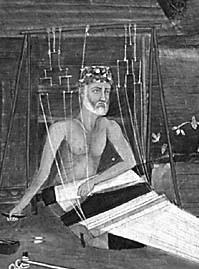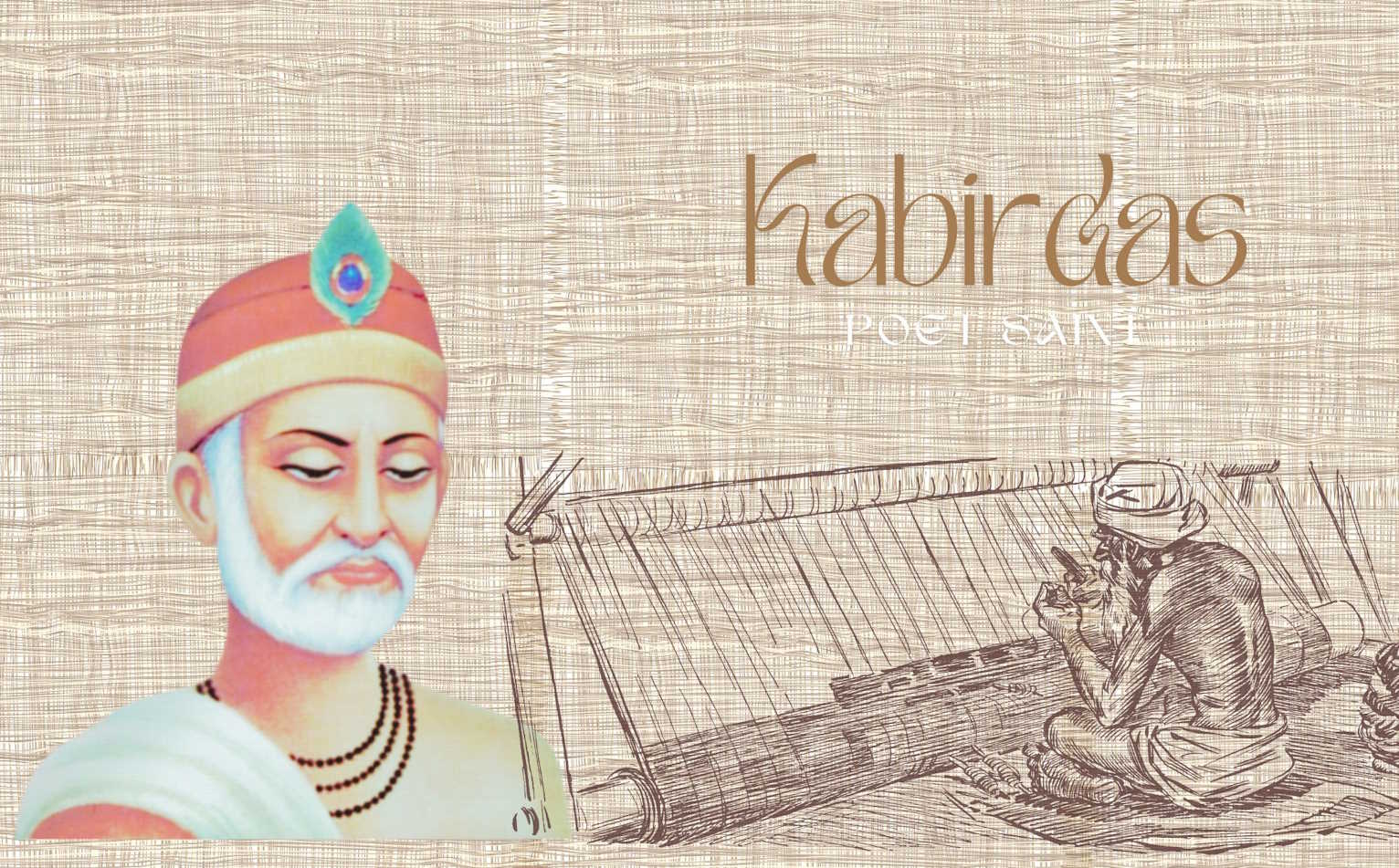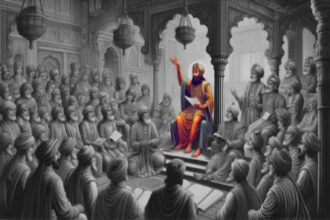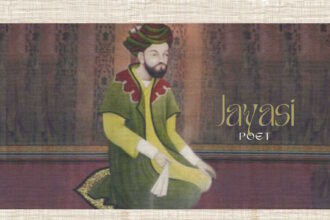Kabir Das is the foreseer poet of middle age Hindi Literature. He is not only a poet but a social reformer saint also. His unique unparellel personality presented the revolution in the society. So, he was the greatest revolutionary of his age.
The Pandits and Mullas, both stood against him and criticized his pinching proclamations, but Kabir Das remained unturned stone, and said what he felt. He said :
” सब कहते कागद की लेखी / मैं कहता आंखिन की देखी ।”
(All say what is written in the scriptures, I say what I have seen by my eyes )
He sternly attacked in his poems over the false, worthless outward showings and symbols in so called religious rituals, and in traditional, trifle mischievous facts and functions. He proved Ram-Rahim and Keshav-Karim – the one – for the sake of Hindu-Muslim unity. His unapoliging personality and preaching has proved itself remedy for the diseased contemporary society.
His Birth

Learned men have different ideas about Kabir’s birth-place and birth time. Together with, several unrecorded tellings too have got co-related about his life. On this basis, some say that a famous Pandit of Kashi met Acharya Sri Ramanand with his widow daughter. He blessed the daughter to have a son. That boon, not being fruitless caused Kabir to take birth in Kashi. The son appeared from her palm as she was blessed, this source, Kartal (Palm) made his son ‘Karveer’, and after some duration, ‘Kabir’.
There is a ‘Sukti’ in Sanskrit that people’s assertions are not generally rootless – “न ह्यमूला जन श्रुति”। That is why , it was accepted that the birth of Kabir took place from a widow Brahmini, who fearing, getting ashamed in the relations, threw her new-born infant near the pond named ‘Lahartara’.
Afterward, Neeru and Neema, the childless couple, brought the child with them and nourished. In Kashi, Kabir became the son of Muslim caste, though some where he himself asserted :
“काशी का मैं वासी बाम्हन, नाम मेरा परवीना/ एक बार हरि नाम बिसारा पकरि जुलाहा कीन्हा”
(I am the resident of Kashi in Brahmin Caste. My name is Parveen. Once I forgot the name of ‘Hari’ (God) and I was forced to be ‘Julaha’ (Muslim)”.
His date of birth has been proved on Jyeshtha Purnima, Samvat 1455, (in the year 1398 AD). His ‘Guru’ was ‘Acharya Ramanand’, ‘Ram-Nam‘ was his ‘Guru-Mantra’, and Nirgun Ram was his God – ‘Brahma’. Loi (लोई) was his wife and ‘Kamaal’ his son and ‘Kamaali’ his daughter.
He left Kashi refusing the faith anciently accepted that Kashi gives ‘Moksha’, the disconnection from all ties. He took his last breath in ‘Maghar’ in Samvat 1575. On dispute whether Hindu rituals would be done after his death or Muslim’s burial will take place, only flower appeared at the place of his dead body, and both did as they wished. Thus the life of uneducated Kabir amazes the educated ones.
His Poetry

Kabir Das was really a reformer, preacher and progressor of religious factual essences. Thousand and Thousand of saints are in the world but Kabir is unique. His practical gravitation for a keen reader is the spring in desert. Poetry of Kabir needs not intellectual discriminations and critical operations, but a thirstful drinking and assimilated appreciation and enjoyment. Kabir’s Poetry is a call, an invitation, a welcome to the seekers not for the sake of aesthetical but of ethical values.
Whatsoever Kabir wrote, was for the welfare of the society. He sternly disclosed the worthless deeds that misled the innocent persons of the society and challenged both Hindus and Muslims for their mischief and fraudness. He, blaming Hindus faith vanity, said :
“पाहन पूजे हरि मिले तो मैं पूजूं पहाड़
ताते यह चक्की भली पीस खाय संसार”।
(“If God is found by worshipping the stone, I will worship the mountain. Better it is to worship the grinder of the house which grinds the wheat and flour is eaten by the whole world.”)
Thus he ridiculed Muslims too :
“कांकर पाथर जोरि के मस्जिद लियो बनाय
ता चढ़ि मुल्ला बांग दे,क्या बहरा हुआ खुदाय”
(By assembling the pebles of stones The ‘Masjid’ has been erected. The Mulla climbing on it cries and calls God. Has the God been Deaf?”)
एक खून एक बन्दगी कैसे खुशी खुदाय ।”
(The day they spent in bidding of God (Roja) and in night they crush and kill the Cows. In one side the murder and in another side the worship – Can it please God? How it can be?)
He scolds both Hindu and Muslims together :
“जो तू बाम्हन बाम्हनी जाया और राह ते काहें न आया
जो तू तुरुक तुरूकिन जाया, पेटे काहें न सुनत कराया ।”
(O Brahimini ! If you gave birth to Brahmin, Why did not he come from the other way from the womb. O Turukin ! If you gave birth to Turuk, Why did you not make ‘Sunnat’ in the womb?)
That is why he says :
इन दोउन राह न पायी – both have not found the way .
Kabir’s sever attack is on the outer showiness in religious functions –
“मन ना रंगायो, रंगायो जोगी कपरा ।
आसन मारि मंदिर में बैठे नाम छाड़ि पूजन लगे पथरा ….
दढ़िया बढ़ाय जोगी बनि गये बकरा …।
(O yogi ! you did not colour your ‘Man’ (Spirit) in God’s colour. You only coloured your clothes. You got yourself seated firmly in temple, and instead of remembering God’s name, started worshipping the idol. Your face became the abode of hair and this beared figure made you he-goat.)
The poetical bell that Kabir rang exclaimed that God is no-where else but in you, as there is smell in the flowers, and Kastoori in the navel of the deer –
“तेरा सांई तुझमें, ज्यो पुहूपन में बास
कस्तूरी का मिरिग ज्यों फिर-फिर ढूंढे घास ।”
(Your God is in you as the fragrance in the flower. But you wander in search for that smelling grass which in you resides as the Kasturi deer wanders for it.)
Philosophical Approach
What is the philosophical approach and a seer’s vision of Kabir Das? It is undualistic faith (Advait Vad). He accepts ‘Atma’ (Self) and ‘Paramatma’ (God) the one. He is mystical poet, and at several places he discloses his vision as Ram (God) his husband, and he His wife :
“पिउ मोरे राम मैं तो राम की बहुरिया”…(Ram-God is my husband and I, His wife..)
“आज घर आये हो राजा राम भरतार” …(Ah ! how fateful ! today my husband, my lover came into my house.)
Maya, the illusion has cheated entire world. Only ‘Gyani’ can disperse the darkness of illusion –
“महा ठगिनी हम जानी
माया, महा ठगिनी हम जानी ।”
(I knew, I knew Maya is the greatest cheater)
or
“रमैया की दुलहिन लूटल बजार हो…”(This beloved of God looted the market )
In his poems Kabir’s search shows that searcher does not find Him, but he becomes God himself :
“लाली देखन मैं गयी, मैं भी हो गयी लाल”।(I went to see the redness of my God, and I myself became red and red by it.)
On mystic poems of Kabir, scholars still ponder over earth with a deep searching eye. R.N. Tagore translated his several verses with great attached appreciation in English.
Dectator of Tongue
Kabir is such a poet who never touched the ink and paper with his hand, and never put his fingers on pen :“मसि कागद छुयो नहीं, कलम गही नहिं हाथ ”
But Satsang (the meeting with saints) made him poet and he felt what has been narrated by him. His language of the poems is mixed, the mingling of several tongues- Avadhi, Bhojpuri, Punjabi, Marwadi etc. That’s why it is ‘Panchmel Khichadi’ (The mixed foodplate of five languages). The prominent essayist and critic of Hindi Literature ’Hazari Prasad Dwivedi’ has very properly and keenly commented on his language :
“कबीर का भाषा पर जबर्दस्त अधिकार था । वे वाणी के डिक्टेटर थे । जिस बात को उन्होंने जिस रूप में प्रकट करना चाहा है, उसे उसी रूप में भाषा से कहलवा लिया है, बन गया तो सीधे-सीधे, नहीं तो दरेरा देकर ।
(“Kabir had extra-ordianary command on langauge. He was dectator of tongue. What he wanted to present, and in which way he wanted, he has made it dectated by langauge, either directly or by force.”)
He was ‘Sadhak’. He sang and sang and did in literature unparallel. Kabir like poets are seldom seen in any literature of the world. The only collection of his poems is “Beezak’ having parts-‘Sakhi’, ‘Sabad’ and ‘Ramaini’.











